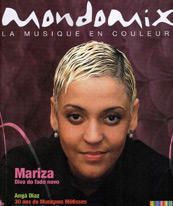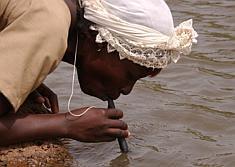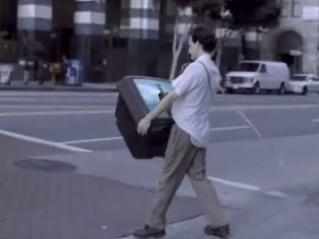Mariza chante le Fado
 Chanteuse d’un fado atypique et métissé, Mariza, née au Mozambique est reconnaissable à ses cheveux ras teints en blond. Cette chanteuse portugaise, appelée souvent "la nouvelle Amalia" en référence à Amalia Rodrigues, la diva du fado, a été nommée "Meilleure révélation de l’année" et "Plus belle voix du fado" en 2000, son talent pour créer lors de ses concerts, une ambiance proche du cabaret fait de cette jeune chanteuse l’une des étoiles de la scène portugaise. Si elle s'est imposée avec "Fado em Mim" et "Fado Curvo" comme la nouvelle gloire du fado, Mariza se fait un point d'honneur de bousculer le genre. À cet égard, son second album montrait la voie. On retrouve de façon plus achevée cette volonté de différence dans "Transparente". La fadiste présente une musique métissée et pourtant ancrée dans la tradition, subtilement nourrie de son folklore et des musiciens qui l'accompagnent. Le fado, une sorte de "blues portugais" qui chante la saudade (la nostalgie), depuis le XIXème siècle, connaît aujourd'hui un renouveau, avec des chanteuses comme Mariza, Cristina Branco, Misia ou encore Mafalda Arnaut.
Chanteuse d’un fado atypique et métissé, Mariza, née au Mozambique est reconnaissable à ses cheveux ras teints en blond. Cette chanteuse portugaise, appelée souvent "la nouvelle Amalia" en référence à Amalia Rodrigues, la diva du fado, a été nommée "Meilleure révélation de l’année" et "Plus belle voix du fado" en 2000, son talent pour créer lors de ses concerts, une ambiance proche du cabaret fait de cette jeune chanteuse l’une des étoiles de la scène portugaise. Si elle s'est imposée avec "Fado em Mim" et "Fado Curvo" comme la nouvelle gloire du fado, Mariza se fait un point d'honneur de bousculer le genre. À cet égard, son second album montrait la voie. On retrouve de façon plus achevée cette volonté de différence dans "Transparente". La fadiste présente une musique métissée et pourtant ancrée dans la tradition, subtilement nourrie de son folklore et des musiciens qui l'accompagnent. Le fado, une sorte de "blues portugais" qui chante la saudade (la nostalgie), depuis le XIXème siècle, connaît aujourd'hui un renouveau, avec des chanteuses comme Mariza, Cristina Branco, Misia ou encore Mafalda Arnaut.Voir la video









